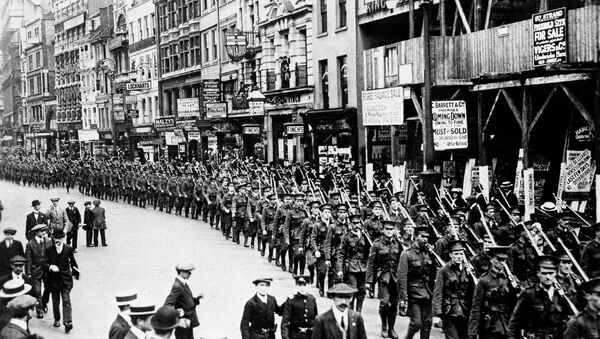Oleg Nazarov — A hundred years ago, on July 28, 1914, Austria-Hungary attacked Serbia. On August 1 Germany declared war on Russia and on August 3 on France and Belgium. Fearing that the Germans could seize Belgium, Britain declared war on Germany on August 4. World War I began.
Analyzing the causes of the catastrophe, patriarch of US diplomacy Henry Kissinger concluded that neither Russia nor Germany had a single specific claim against each other that would be worth even a local war, let alone a world war.
Russia made no claims against Berlin but merely objected to Serbia's destruction by the Habsburg Empire.
Meanwhile, London and Berlin had many differences in various parts of the world while Paris had a craving to win back Alsace-Lorraine from Germany.
The world war was prepared not by Nicholas II and the "Russian barbarians" but by cousin Willy and other representatives of a "civilized Europe." The leaders of Germany, Austria-Hungary and Britain, Western financiers, industrial magnates, politicians, military leaders and diplomats were working to unleash it. Each of them hoped that the war would bring material and political gain to his country and him personally. Even the elites of their colonies entertained such dreams.
No man is a prophet in his own land
There are many realistic and sophisticated analysts whose predictions are interesting to read today.
In remote 1886 the now unpopular Friedrich Engels paid attention to the fact that the contradictions between the world's leading states made a localization of armed conflicts impossible between them. Before his death in 1895 he said that only a global war was possible between them. As distinct from the military leaders of the great powers that claimed until the beginning of the war that it would only last for a year, Engels predicted that it would last for three or four years and would end with the rout of Germany.
In February 1914 the right-wing leader in the Russian Empire's State Council, Pyotr Durnovo, submitted a letter to Tsar Nicholas II. He predicted that the war would be waged by coalitions headed by Britain and Germany and that in the Entente Russia was bound to bear the brunt of the burden.
Durnovo was overtly skeptical about rapprochement between St. Petersburg and London. He believed that an alliance with Britain would not bring any benefits to Russia. Analyzing potential geopolitical gains and losses he noted that "Galicia may be the only prize in this war," adding that "only a lunatic would want to annex Galicia. Whoever annexes Galicia will lose an empire."
Durnovo said that if Russia failed to win the war, "a social revolution at its most extreme would be inevitable in this country."
The political elites of the great powers ignored the warnings of the German socialist and Russian monarchist, and launched the war.
Shocking results of World War I
Strange as it may seem, the war was welcomed by the masses. British historian Gordon Craig wrote that this was an unusual mixture of unrealized patriotism and romantic joy over participation in a great adventure; it was also a naïve expectation that the conflict would resolve many accumulated problems. The majority of Germans believed with the same zeal as the Brits and French that their country was the victim of a brutal attack.
Russians had no illusions in this respect. Even outright Russophobes and history rewriters do not dare blame Russia for unleashing World War I.
The results of the war were shocking. Millions were killed, injured or mutilated. Cities lay in ruins and villages were deserted. As historian Yelena Senyavskaya wrote, "the war shook the world's public consciousness and inflicted psychological stress on all of modern civilization by showing that all the scientific, technical, cultural and ostensibly moral progress that had been achieved by humanity failed to prevent a rapid slide into a state of bloody barbarity and savagery."
Later the "civilized West" so skilfully ruled the world that it did not have to wait for long for a new slip into "a bloody barbarity and savagery.
The struggle between the Soviet-led advocates of collective security and the Western democracies that were trying to appease an aggressor unfolded in the world arena. Conniving at Germany, Britain and France hoped to channel its aggression eastward.
On September 30, 1938 Britain, France and Italy met in Munich without the USSR and allowed Hitler to ravage Czechoslovakia. On his return to London, British Prime Minister Neville Chamberlain said he brought "peace for our time." However, in less than a year the Brits were again off to war. The USSR was also unable to avoid the war.
Both world wars were started by Western countries, Germany being the main aggressor both in 1914 and in 1941.
In 2014 — for the third time in a hundred years —humanity is again approaching the brink of a world war. The US-led West is again ready to fall into the same Russian trap that had hurt Germany so much in the past. True, as distinct from the Germans, the Americans prefer to fight by proxy, but would they manage to sit out a world war from overseas?
We should admit that if the instinct for self-preservation does not stop American hawks, no peace-loving statements by Russian diplomats will help prevent a third world war. Just like tsarist and Soviet diplomats failed to prevent the first two world wars.
So, it is pointless to fear war.
If we are ready for the worst, we will survive the better times.
Oleg Nazarov, PhD (History) is a member of the Rossiya Segodnya Zinovyev Club

